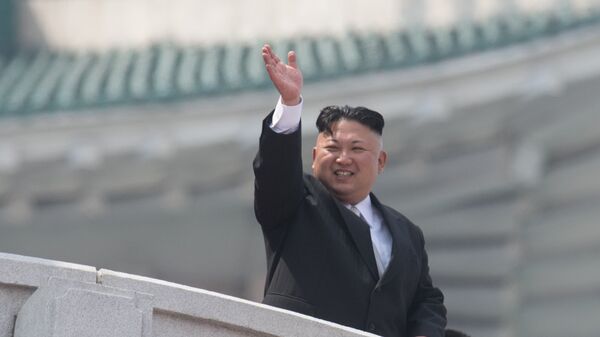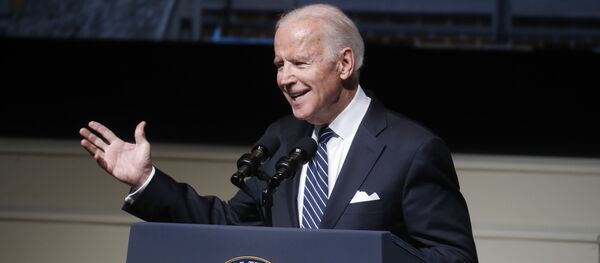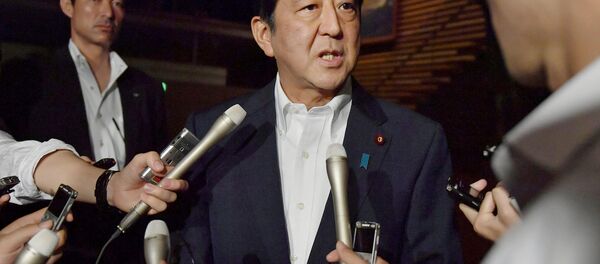MOSCOW (Sputnik), Tommy Yang — North Korea’s recent intention to hold dialogue with South Korea, following almost a full year of escalating tension on the Korean peninsula amid rapid progress of Pyongyang’s nuclear arms program, could be part of North Korean leader Kim Jong-un’s strategy from the very beginning, experts told Sputnik.
During a televised New Year’s Day speech, the North Korean leader expressed his willingness to improve ties with South Korea and said he was open to hold a dialogue, stressing the importance of lowering tensions on the Korean peninsula. Kim added that he would consider sending a North Korean delegation to the Winter Olympics set to take place in Pyeongchang, South Korea, in February.
In addition, a direction communications hotline between the two nations has been reopened this week. As of Thursday, South Korean officials at the DMZ border have talked with the North Korean side over the phone for two consecutive days.
Strategy All Along
After North Korea continued to conduct missile tests and successfully tested its most powerful nuclear bomb, leading to unprecedented escalating tension on the Korean peninsula in 2017, Kim’s apparent sudden change of attitude by offering to hold dialogue with South Korea could be an important part of his long-term strategy, experts suggested.
"I think this could have been his strategy all along. It’s just the Americans wouldn't want to engage in any kind of dialogue, without the precondition of denuclearization. I think that’s a non-starter for him. He has held out as long as he could and try to put the pressure on to see if the Americans would change their mind. But they haven't. The last straw he has left is South Korea. Along with the pressure from China has pushed him to change his mind about how to deal with this situation. Whether to keep pushing the Americans or the get the South Koreans to work with him on this, or to get the Americans on board later on. We didn't know beforehand whether or not he was going to do it this way. There were theories that some people were saying this. It certainly fits that hypothesis quite well," James Kim, an international relations expert at the Asan Institute for Policy Studies in Seoul, told Sputnik.
The Seoul-based expert suggested that the North Korean leader may not have the intention to complete the development of the nuclear arms program.
"There were some people were saying that, before the North Koreans reached out and responded positively, the North Koreans will not have the intention to complete their [nuclear] development cycle. They would eventually leave that final stage unfinished. Kim Jong-un would try to make an appeal for some kind of dialogue or discussion," he said.
Further Demonstrations
In late November, North Korea successfully tested its latest intercontinental ballistic missile (ICBM), known as the Hwasong-15, which security experts said could have a range of more than 13,000 kilometers (8100 miles), capable of reaching any part of the mainland of the United States.
The North Korean government said that the Hwasong-15 type missile system is the most powerful ICBM which meets the goal of the completion of the rocket weaponry system development set by the Democratic People’s Republic of Korea, according to a statement released by the official Korean Central News Agency.
However, Professor Kim from the Asan Institute for Policy Studies raised some questions regarding to North Korea’s nuclear capabilities.
"We don’t really know that if he [Kim Jong-un] has mastered re-entry capability yet. We also do not know that he has miniaturized. He needs to detonate above ground. Every nuclear state that we know has a nuclear capability has tested above ground. I don’t see why North Korean wouldn’t engage in that test to show they have this capability. They also need to show that they could do this with a long-range missile that has a fair degree of accuracy. They haven’t done that yet. There’s still that last stage left that they haven’t shown. From a diplomacy standpoint, if they want to make the case that they have this capability, they still need to show a couple of things," he said.
The South Korean expert believes North Korea is expected to carry out further missile tests in 2018 but may refrain from conducting additional nuclear tests.
Minimize Miscalculations
Nevertheless, Professor Kim pointed out that the direct communications hotline being reopened could help avoid any possible misunderstanding or miscalculations from both sides.
"The development can mean that there are formal accounts of communication between the two governments [South Korea and North Korea]. In that sense, this is better than not having those channels open. In terms of handling problems that may arise from miscommunication, you can minimize those risks," he said.
The South Korean expert believes initiating dialogues with Seoul could lead Pyongyang toward the right path.
"Obviously, the United States has been continuing to push on the condition of denuclearization and they [North Koreans] do not want to engage in any dialogue on those issues. The only party that is willing to sit down and talk with the North Koreans about this issue is the Moon administration. I don’t think they [North Koreans] have many choices here. If they want to engage in any kind of dialogues or talks to negotiate a way out of this escalation cycle, this would have been the right way to do it for them," he said.
Avoid Traps
At the same time, South Korean security experts warned authorities in Seoul not to fall for typical traps from North Korea’s dual-track strategy, which aims at driving a wedge between South Korea and the United States.
"The new advance is the demonstration of typical North Korean strategy toward the outside world, especially toward the United States and South Korea. This is a typical dual-track approach. North Korea wants to show its intention to reconcile with South Korea while bashing the United States at the same time. The danger is that unless the South Korean government is very vigilant and careful, the trap of this North Korean strategy could lead to the alienation of the alliance, driving a wedge between Seoul and Washington. We should be very careful about that danger," Cheon Seong-whun, a former presidential secretary for security strategy in South Korea until early 2017, told Sputnik.
The former South Korean official added that there have already been many warning signs coming from Washington.
READ MORE: Rocket Man Blues: Flat-Earther's Self-Launch Plan Hits a Snag
Commenting on North Korea’s initiative to open dialogue with South Korea, US President Donald Trump expressed his skepticism in a message posted on his official Twitter account. "Rocket man now wants to talk to South Korea for the first time. Perhaps that is good news, perhaps not — we will see!" Trump wrote.
"Our policy with North Korea has not changed. We’re fully committed to continuing to apply maximum pressure and working with all of our partners in the region, including South Korea, who we have a better relationship with now than ever before," Sarah Huckabee Sanders, the White House press secretary, said during a regular press briefing Wednesday.
Don’t Cross the Line
South Korea needs to maintain a clear policy stance when engaging with North Korea, the South Korean security expert stressed.
"The South Korean government should be very clear on their standing. Without North Korea’s denuclearization, any types of dialogues or talks, or even collaboration between South Korea and North Korea, should have certain limits. We have the international sanctions and UN Security Council resolutions, as part of the international community’s efforts to press North Korea to give up its nuclear weapons. This limits our room for maneuver, from the South Korean government’s point of view," he said.
The expert warned South Korean authorities not to cross the line, which could be viewed as violating existing international pressure against North Korea.
The expert added that such a situation would not be good from South Korea’s national interest’s standpoint.
The views and opinions expressed by James Kim, Cheon Seong-whun are those of the experts and do not necessarily reflect those of Sputnik.



